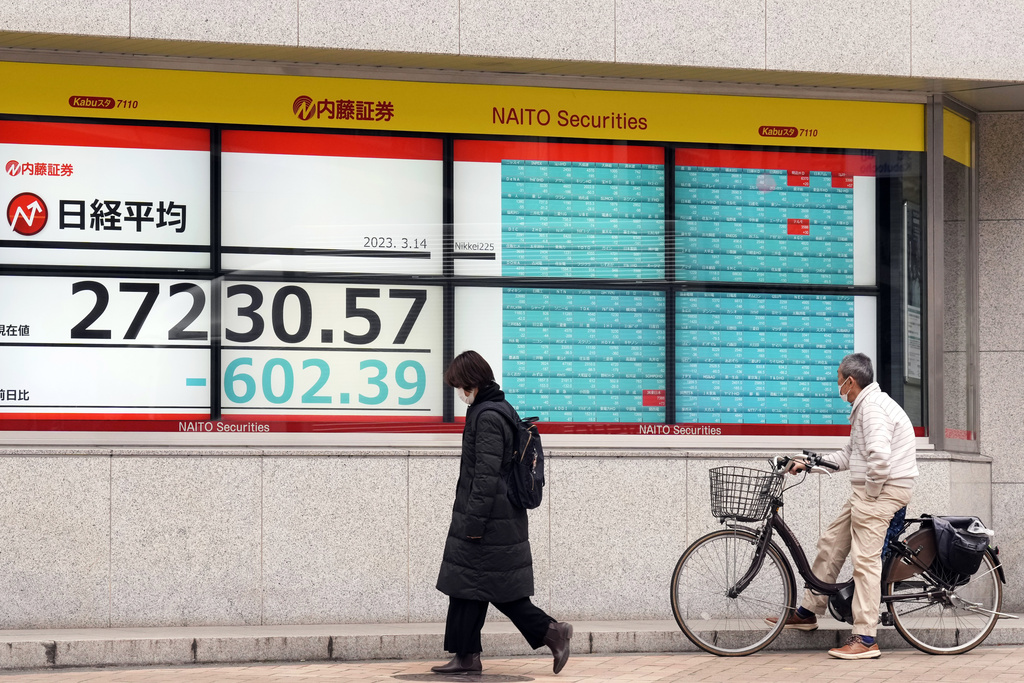
The fall of Silicon Valley Bank (SIVB), a lender that services mainly start-up technology companies and venture capital (VC) funds, has spooked investors in Japanese banks.
SVB’s problems were compounded by the tens of billions of dollars in excess liquidity it invested in long-term bonds, taking a view that interest rates would remain stable and low. Bond prices and yields have a see-saw relationship: as rates go up, prices go down. As central banks curb inflation with higher interest rates, a rise in bond yields reduces the nominal value of bonds, squeezing the bank’s liquid assets to fulfill bank withdrawal requests.
Japanese banking stocks fell significantly in the wake of SVB’s collapse and other macro factors. Through Tuesday, shares in Mitsubishi UFJ Financial Group, Mizuho Financial Group, and Sumitomo Mitsui Financial Group slumped around 12% from Friday's close. Japan Post Bank fell 5.5%.
While not directly impacted, Japanese banks share some characteristics with Silicon Valley Bank in terms of substantial holdings of bonds but denominated in both the U.S. dollar and Japanese yen. “As far as their holdings of USD-denominated bonds are concerned, they are already impacted by rising U.S. bond yields,” says Michael Makdad, a Tokyo-based senior equity analyst at Morningstar.
Banks’ ownership of yen-denominated bonds could pose the same threat but will only materialize if Japanese yields “ever rise beyond the currently pegged ceiling of 0.50% for the 10-year Japanese government bond yield,” says Makdad.
According to PitchBook data, the most vulnerable banks are Japan Post Bank (7182) and unlisted Norinchukin Bank. No-Moat Japan Post Bank warrants a two-star rating. Investment securities represent 58% of the bank’s total assets, with 34% invested in foreign bonds and 16% in Japanese government bonds.
While avoiding a bank run and a solvency crisis ultimately hinge on a bank’s competency to manage bond portfolios over time, concerns remain on smaller regional lenders in Japan in times of market stress, he adds. Shinkin banks, which are deposit institutions similar to credit unions, also have relatively high exposure and might be under pressure.
The major banks under Morningstar’s equity coverage are considered “sophisticated in hedging and have treasury operations as a profit center,” according to Makdad. These elements will be critical for Japanese banks to be able to appropriately manage rising bond yields. He therefore sees runs on bank deposits as a limited risk.
Eyes Should Remain On Macro Developments
Japanese banks are under pressure for other reasons as the sector will be severely impacted by a potential hard landing in the U.S. economy and any pivots by the Federal Reserve to cut rates.
Investors in Asian financials should instead zero in on two risks, says Makdad. “The risk for these banks’ earnings and share prices lies more if the US economy goes into recession, or if the Federal Reserve pivots to cutting US policy rates and thereby affects the path for Japanese policy rates, rather than in their bond portfolios,” Makdad adds.
The market’s flight to bond safety has pushed bond yields lower, which Makdad thinks sees as somewhat relieving pressure on Japanese banks with high dollar bond holdings.
HSBC Scoops U.K. Arm of SVB
On Monday morning, HSBC (00005) said its ring-fenced U.K. subsidiary, HSBC U.K. Bank PLC, has acquired Silicon Valley Bank U.K. Ltd, for the nominal price of £1 (US$ 1.22). “The transaction completes immediately,” HSBC said.
According to HSBC, as of Friday SVB U.K. had loans of around £5.5 billion, around 2.2% of HSBC’s U.K. loan size and 0.7% of its total global loans, according to Morningstar estimates. The deal came with deposits of around £6.7 billion, or about 1.6% of HSBC’s U.K. deposit size and 0.5% of HSBC’s total global deposits.
Makdad says: “Given the purchase price of £1, there should be a gain on purchase, with SVB U.K.'s tangible equity being around £1.4 billion minus provisions taken. I think the ability to immediately close this acquisition is net positive for HSBC, though not very large relative to the size of the whole global bank.”
The bank confirmed that any assets and liabilities of SVB U.K.’s parent company were excluded from the transaction. "This acquisition makes excellent strategic sense for our business in the U.K.,” said chief executive Noel Quinn. “It strengthens our commercial banking franchise and enhances our ability to serve innovative and fast-growing firms, including in the technology and life-science sectors, in the U.K. and internationally. SVB U.K. customers can continue to bank as usual, safe in the knowledge that their deposits are backed by the strength, safety, and security of HSBC."
The issue of rising U.S. bond yields that originally pressured Silicon Valley Bank is an issue mainly for Japanese banks but not really most others in Asia. Banks from Hong Kong and Singapore do not hold the same level of US bonds as the Japanese do.
Read more: What’s Silicon Valley Bank? And Why Does It Remind Investors of the GFC?






.png)









.jpg)





